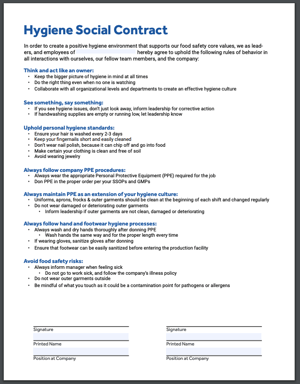How to Create a Food Safety Culture Plan for Your Organization
This is the third article in our continued discussion about food safety culture plans, you can read the other posts here:
1. What is a food safety culture?2. What can impact a food safety culture?
4. Maintaining and reinforcing a food safety culture
Hygiene essentially is a series of procedures that, when followed correctly, ensure that contamination risks to food safety are avoided. However, even the best written Sanitation Standard Operating Procedures (SSOPs) for hygiene in food processing are sometimes circumvented because they are simply at odds with natural human behaviors.
A Food safety culture plan is a primary component of operational hygiene as well as the mental aspect of food safety. This mindset strives overcome variability of human behavior with a shared understanding of what food safety culture entails and the things that can impact that culture. As such, this mindset must permeate the entire organization to ensure adequate understanding and proper food safety. While that may seem like a daunting task, here are two simple steps to begin creating this very culture at your own organization:
Start Using a Hygiene Social Contract
 Essentially, a social contract is an agreement amongst people for a common benefit, even the U.S. Constitution can serve as an example of a social contract. A hygiene social contract helps communicate hygiene procedures and the responsibilities of production team members in an informative and simple manner to ensure food safety.
Essentially, a social contract is an agreement amongst people for a common benefit, even the U.S. Constitution can serve as an example of a social contract. A hygiene social contract helps communicate hygiene procedures and the responsibilities of production team members in an informative and simple manner to ensure food safety.
This hygiene contract empowers employees to take personal responsibility for their part in maintaining the quality and safety of food they produce. Employees are encouraged to think and act like owners. If they see non-compliance, they are encouraged to address and report those situations to ensure that SSOPs are followed.
It is important that everyone from executives to production team members feel accountable for upholding themselves and others to the best hygiene standards for food safety. While policing hygiene behavior with randomized audits can serve a role, what's more effective is creating that hygiene culture where employees do the right thing even when nobody is looking. The social contract serves as a tool to begin instilling this idea that all individuals are responsible for food safety and hygiene, all the time.
Teach Food Safety Culture During Onboarding and Training
 Making a food safety culture part of an employee's mindset should start from the earliest possible point in their career. Using the social contract as part of the onboarding process demonstrates to the new hire that the entire organization takes hygiene and food safety seriously. On their first day, when they sign that contract, they are made equally responsible for upholding the organization’s hygiene and food safety standards.
Making a food safety culture part of an employee's mindset should start from the earliest possible point in their career. Using the social contract as part of the onboarding process demonstrates to the new hire that the entire organization takes hygiene and food safety seriously. On their first day, when they sign that contract, they are made equally responsible for upholding the organization’s hygiene and food safety standards.
The nuances of your organization’s food safety culture should be reinforced during their first few weeks. New hires should be assigned a hygiene mentor to help them properly navigate hygiene zones and follow SSOPs. This mentor can support compliance through education and prevent violations through one-on-one coaching. The mentor is also able to answer any questions the new hire may have about food safety.
For more tips on how to onboard new employees and introduce them to a food safety culture reference our onboarding checklist. This checklist details the critical points to cover with new hires to ensure they are fully aware of all hygiene SSOPs and how to communicate the risks of not following or becoming complacent of these.
Overall, educating your employees on your expectations and policies using a hygiene social contract during the onboarding process is a great start in embracing a food safety culture plan at your organization. However, education is not enough to make an impact unless it is constantly reinforced throughout the year. In our next post, we'll cover how continued education and support can help institute a good food safety culture plan at your organization. To jumpstart your food safety culture initiatives, register for our Employee Hygiene Toolbox today!







